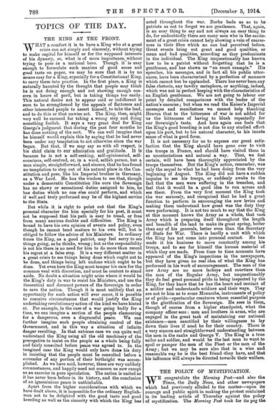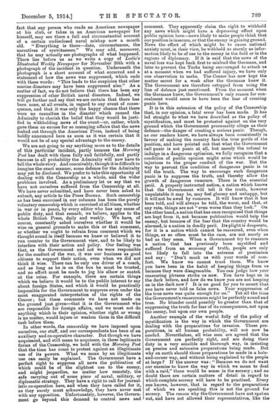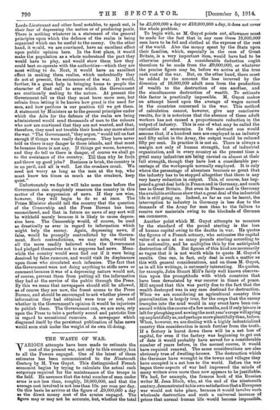THE POLICY OF MYSTIFICATION.
W.E congratulate the Morning Post—and also the Times, the Daily News, and ether newspapers which had previously alluded to the matter—upon its courage and public spirit in making the protest contained in its leading article of Thursday against the policy of mystification. The Morning Post took for its peg the fact that any person who reads an American newspaper at his club, or takes in an American newspaper for himself, may see there a full and circumstantial account of a certain undisclosed naval mishap now a month old. " Everything is there—date, circumstances, the narratives of eyewitnesses." We may add, moreover, that he may actually see photographs of what happened. There lies before us as we write a copy of Leslie's Illustrated Weekly Newspaper for November 26th with a photograph of the incident in question. Underneath the photograph is a short account of what occurred and a statement of how the news was suppressed, which ends with these words : " This leads to the suspicion that other marine disasters may have been suppressed also." As a matter of fact, we do not believe that there has been any suppression of other British naval disasters. Indeed, we will go further and say that we are certain that there has been none, at all events, in regard to any event of conse- quence, and that it was only the happy chance that there were no casualties in the disaster which caused the Admiralty to cherish the belief that they would be justi- fied in withholding news of the event—or, rather, which gave them an excuse for so managing affairs that the news leaked out through the American Press, instead of being boldly announced here as soon as it was certain that it would not be of any special advantage to the enemy.
We are not going to say anything more as to the details of this particular incident, partly because the Morning _Post has dealt with them fully and faithfully, and partly because in all probability the Admiralty will now have to tell the whole story. And conceivably, though it is difficult to imagine the exact manner, some defence for the Admiralty may yet be disclosed. We prefer to take this opportunity of dealing with the Censorship as a whole, and the wider problems involved. As a preliminary let us say that we have not ourselves suffered from the Censorship at all. We have never submitted, and have never been asked to submit, any article to the Press Bureau. Such censorship as has been exercised in our columns has been the purely voluntary censorship which is exercised at all times, whether in war or in peace, by every editor who has any sense of public duty, and that remark, we believe, applies to the whole British Press, daily and weekly. We have, of course, constantly asked ourselves whether it would be wise on general grounds to make this or that comment, or whether we ought to refrain from comment which we thought sound in itself because we knew or believed it to run counter to the Government view, and to be likely to interfere with their action and policy. Our feeling was that, as the Government and not we were responsible for the conduct of the war, it was our business as good citizens to support their action, even when we did not think it wise. There can be only one driver of a coach, and as long as he is on the box he must be trusted, and no effort must be made to jog his elbow or snatch at the reins. For example, there are certain things which we believe it would be to the public interest to say about foreign States, and which it would be practically impossible for the Government to suppress even under the most exaggerated interpretation of the rights of the Censor ; but these comments we have not made on the ground just given—that it is the Government who are responsible for foreign affairs, and we must not do anything which in their opinion, whether right or wrong is no matter, would injure or weaken them in the difficult task before them.
In other words, the censorship we have imposed upon ourselves, our staff, and our correspondents has been of an auxiliary and co-operative character. But though we have acquiesced, and still mean to acquiesce, in these legitimate forms of the Censorship, we bold with the Morning Post that the time has come to protest against an illegitimate use of its powers. What we mean by an illegitimate use can easily be explained. The Government have a perfect right to suppress all news the publication of which could be of the slightest use to the enemy, and might jeopardise, no matter how remotely, the safe carrying out of some piece of naval, military, or diplomatic strategy. They have a right to call for journal- istic co-operation here, and when they have called for it, as they surely must acknowledge, they have never met with any opposition. Unfortunately, however, the Govern- ment go beyond this demand to control news and
comment. They apparently claim the right to withhold any news which might have a depressing effect upon public opinion here—news likely to make people think that our position is insecure, or that the enemy is gaining ground. News the effect of which might be to cause national anxiety must, in their view, be withheld as sternly as infor- mation likely to be of use to the enemy in the field or in the regions of diplomacy. If it is said that the news of the naval loss was kept back first to mislead the Germans, and later to prevent the Turks being encouraged to attack us at a moment when we had suffered injury, we have only one observation to make. The Censor has now kept the matter secret for a week after the Germans knew it. The Government are therefore estopped from using the line of defence just mentioned. From the moment when the Germans knew, the Government's only reason for con- cealment would seem to have been the fear of creating panic here.
It is in this extension of the policy of the Censorship that, in our opinion, a fatal error has been made. It has led straight to what we have described as the policy of mystification, and must be protested against on the very ground which the Government presumably allege as their defence—the danger of creating a serious panic. Though, as our readers know, we have always been consistently in favour of making the country face the true perils of the position, and have pointed out that what the Government call panic is not panic at all, but merely the refusal to indulge in a dangerous optimism, we fully recognize that a condition of public opinion might arise which would be injurious to the proper conduct of the war. But the way to prevent this condition of dangerous panic is to tell the truth. The way to encourage such dangerous panic is to suppress the truth, and thereby allow the growth of dangerous rumours. There is the essential peril. A properly instructed nation, a nation which knows that the Government will tell it the truth, however unpalatable it may be, may feel gloomy and unhappy, but it will not be awed by rumours. It will know that it has been told, and will always be told, the worst, and that, at any rate, things are not " even worse than they look." On the other hand, a nation that has once recognized that things are kept from it, not because publication would help the enemy, but because of the fear that the country would be alarmed, is a nation in deadly peril. Its plight is desperate, for it is a nation which cannot be reassured, even when things, as so often must be the case, are not nearly as bad as they seem. When a Government try to reassure a nation that has previously been mystified and suffered from an economy of truth, people are only too likely to fall into the extreme of pessimism and say : "Don't mock us with your words of com- fort. We know we cannot trust them. We know you have been in the 'habit of keeping things from us because they were disagreeable. You can judge how your reassuring phrases strike us now. You have kept us in the dark before, and how do we know you are not keeping us in the dark now ? It is no good for you to assert that you have never told us false news. Your suppression of the true news was quite enough for us." Yet all the time the Government's reassurances might be perfectly sound and true. No blunder could possibly be greater than that of suppressing the truth for fear of its consequences, not upon the enemy, but upon our own people.
Another example of the woeful folly of the policy of mystification is the way in which the Government are dealing with the preparations for invasion. These pre- parations, in all human probability, will not now be needed. Nevertheless, all wise men are agreed that the Government are perfectly right, and are doing their duty in a very sensible and thorough way, in insisting on precise and extensive preparations being made. But why on earth should those preparations be made in a hole- and-corner way, and without being explained to the people at large ? If the answer was : " Because we do not want our enemies to know the way in which we mean to deal with a raid," there would be sense in the secrecy ; and no doubt there are certain matters of detail in regard to which complete secrecy will have to be practised. Every one knows, however, that in regard to the preparations of which we are speaking this is not the ground for secrecy. The reason why the Government have not spoken out, and have not allowed their representatives, like the Lords-Lieutenant and other local notables, to speak out, is their fear of depressing the nation or of producing panic. There is nothing whatever in a statement of the general principles upon which the defence of the realm is being organized which can be useful to the enemy. On the other hand, it would, we are convinced, have an excellent effect upon public opinion here. In the first place, it would make the population as a whole understand the part they would have to play, and would show them how they could best co-operate with the authorities—which they are most willing to do. Next, it would have an excellent effect in making them realize, which undoubtedly they do not at present, the seriousness of the war. It would, further, be a great help in bringing home to people the character of that call to arms which the Government are continually making to the nation. At present the Government tell us that they must have more men, but refrain from letting it be known how great is the need for men, and how perilous is our position till we get them. A statement by Ministers as to the general principles under which the Acts for the defence of the realm are being administered would send thousands of men to the colours who now are convinced that they are not wanted, and that, therefore, they need not trouble their heads any more about the war. " The Government," they argue, " would tell us fast enough if things were really dangerous. They have never told us there is any danger to these islands, and that must be because there is not any. If things get worse, however, and they do tell us there is danger, of course we shall go to the assistance of the country. Till then why be fools and throw up good jobs ? Business is brisk, the country is in no peril, and all is well. Let the croakers croak. We need not worry as long as the men at the top, who must know ten times as much as the croakers, keep quiet."
Unfortunately we fear it will take some time before the Government can completely reassure the country in this matter of the suppression of news. If they are wise, however, they will begin to do so at once. The Prime Minister should tell the country that the question of the Censorship and the Press Bureau has been reconsidered, and that in future no news of any sort will be withheld merely because it is likely to cause depres- sion here. The Censorship would, of course, be used as drastically as ever in regard to information which might help the enemy. Again, depressing news, if false, would be promptly contradicted by the Govern- ment. Such contradictions, we may note, would be all the more readily believed when the Government had pledged themselves not to suppress bad news. Mean- while the country would soon find out if it were being deceived by false rumours, and would visit its displeasure upon those who circulated such infamies. The fact that the Government were not doing anything to stifle news or comment because it was of a depressing nature would not, of course, prevent them from putting all the information they had at the service of the public through the Press. By this we mean that newspapers should still be allowed, as of course they are now, the freest access to the Press Bureau, and should be encouraged to ask whether pieces of information they had obtained were true or not, and whether in the Government's opinion it would be injurious to publish them. The Government can, we are sure, rely upon the Press to take a perfectly sound and patriotic line in regard to sensational rumours. A newspaper which disgraced itself by the persistent publication of false news would soon sink under the weight of its own ill-doing.




























































 Previous page
Previous page